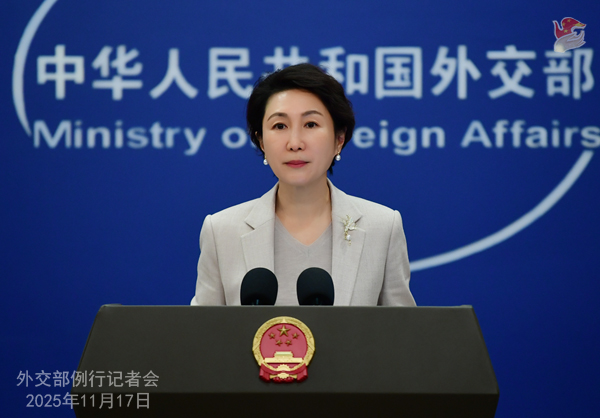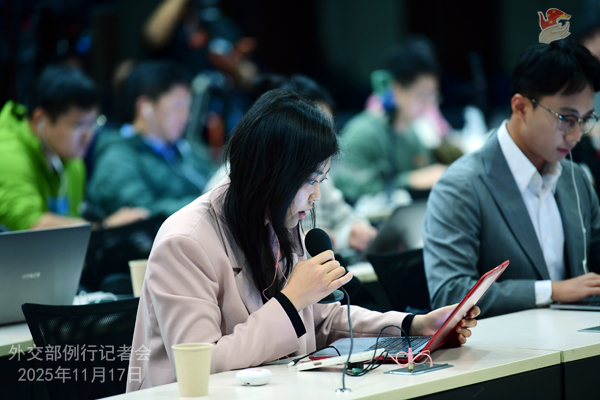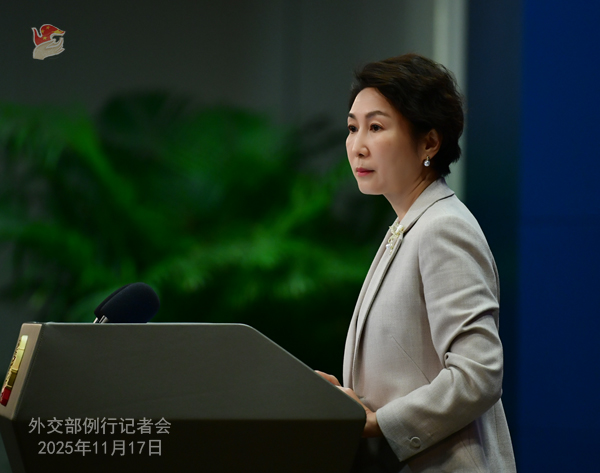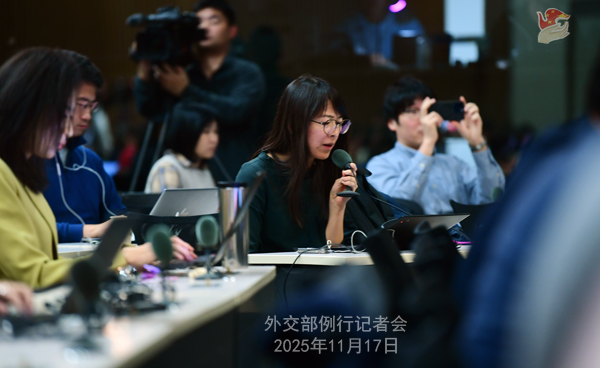
People’s Republic of China


At the invitation of Kyrgyzstan’s Minister of Foreign Affairs Zheenbek Kulubaev, Uzbekistan’s Minister of Foreign Affairs Bakhtiyor Saidov, and Tajikistan’s Minister of Foreign Affairs Sirojiddin Muhriddin, Member of the Political Bureau of the CPC Central Committee and Minister of Foreign Affairs Wang Yi will visit the three countries and hold strategic dialogues respectively with their foreign ministers from November 19 to 22.
Xinhua News Agency: China announced that Foreign Minister Wang Yi will visit Kyrgyzstan, Uzbekistan and Tajikistan and hold strategic dialogues with his counterparts in the three countries respectively. Could you share with us the background of the visits? What does China expect to achieve?
Mao Ning: Kyrgyzstan, Uzbekistan and Tajikistan are China’s friendly neighbors and comprehensive strategic partners. Since the beginning of this year, President Xi Jinping has met with President Sadyr Japarov, President Shavkat Mirziyoyev, and President Emomali Rahmon more than once. Under their guidance, China’s relations with the three countries have been elevated to a new stage.
To implement President Xi Jinping’s common understandings with the three presidents, Member of the Political Bureau of the CPC Central Committee and Minister of Foreign Affairs Wang Yi will visit the three countries and hold strategic dialogues with his counterparts in the three countries. They will exchange their views on bilateral relations and international and regional issues of mutual interest.
China believes that the visit will fully implement the outcomes of the second China-Central Asia Summit and the common understandings between President Xi Jinping and the three presidents, act on the China-Central Asia Spirit, enhance political mutual trust and traditional friendship, deepen high-quality Belt and Road cooperation, and bring about more positivity to the building of the China-Central Asia community with a shared future and the community with a shared future between China and the three countries.
CCTV: Several days ago, some individual Japanese politician said China was “overreacting” to Sanae Takaichi’s remarks on Taiwan. Japan’s Chief Cabinet Secretary Minoru Kihara said the Japanese government’s position on the Taiwan question remains unchanged and is consistent with the 1972 Sino-Japanese Joint Statement. What is China’s response?
Mao Ning: China has made its serious position clear several times on Japanese Prime Minister Sanae Takaichi’s wrongful remarks on Taiwan. The remarks seriously violate the spirit of the four political documents between China and Japan, and cause fundamental damage to the political foundation of China-Japan relations.
During the discussions on resuming China-Japan diplomatic ties, China explicitly put forth three principles: the Government of the People’s Republic of China is the sole and legal government representing the Chinese people; the Taiwan Province is an inalienable part of the territory of the People’s Republic of China; and the so-called “Taiwan-Japan Treaty” is illegal and invalid and must be abrogated.
In 1972, the two countries signed the Sino-Japanese Joint Statement and officially established diplomatic relations. Three places in the Joint Statement are related to the Taiwan question. First, in the opening paragraphs, it is written that the Japanese side “reaffirms its position that it intends to realize the normalization of relations between the two countries from the stand of fully understanding ‘the three principles for resuming diplomatic relations’ put forward by the Government of the People’s Republic of China.” Then Article 2 says that “the Government of Japan recognizes that Government of the People’s Republic of China as the sole legal Government of China.” And Article 3 says that “the Government of the People’s Republic of China reiterates that Taiwan is an inalienable part of the territory of the People’s Republic of China. The Government of Japan fully understands and respects this stand of the Government of the People’s Republic of China, and it firmly maintains its stand under Article 8 of the Potsdam Proclamation.”
In 1978, the two countries signed the Treaty of Peace and Friendship Between China and Japan, which explicitly stated that the Sino-Japanese Joint Statement “constitutes the basis for relations of peace and friendship between the two countries and that the principles set out in that statement should be strictly observed.” The treaty affirmed the principles and contents of the joint statement in legal terms and set out the legal parameters for China-Japan relations.
In 1998, the two sides released the China-Japan Joint Declaration on Building a Partnership of Friendship and Cooperation for Peace and Development, in which Japan undertook to “continue to maintain its stand on the Taiwan question which was set forth in the Sino-Japanese Joint Statement” and “reiterated its understanding that there is one China.” It’s stated in the document that Japan will continue to only maintain its exchanges of private and regional nature with Taiwan, which ruled out the legal possibility of Japan developing official relations with Taiwan.
In 2008, the China-Japan Joint Statement on All-round Promotion of Strategic Relationship of Mutual Benefit stipulated clearly in Article 5 that “The Japanese side reiterated that it will continue to abide by its position on the Taiwan question stated in the Sino-Japanese Joint Statement.”
The above is what is laid out in the four political documents between China and Japan regarding the Taiwan question. It constitutes the solemn commitment made by the Japanese government and has a legal effect under international law. There is no room whatsoever for ambiguity or misinterpretation. Whichever political party or person is in power in Japan, they must always abide by the commitment of the Japanese government on the Taiwan question. We urge Japan to approach history and relations with China in a responsible way, stop crossing the line and playing with fire, retract the wrongful remarks and seriously act to honor Japan’s commitment to China.

Kyodo News: The Director-General of the Japanese Foreign Ministry’s Asian and Oceanian Affairs Bureau, Kanai Masaaki, is expected to arrive in China today. He will hold talks with China concerning Prime Minister Sanae Takaichi’s remarks on Taiwan. What’s China’s comment? Besides, the Chinese government has called on Chinese tourists to avoid traveling to Japan due to rising security risks there. Can you give us any examples?
Mao Ning: On the talks you mentioned, we will release timely information when available. Let me stress that regarding Japanese Prime Minister Sanae Takaichi’s wrongful remarks on Taiwan, China has and will continue to lodge strong démarches and protests with Japan, seriously ask Japan to immediately reflect on and correct its wrongdoing, retract the wrongful remarks and stop making provocations on China-related issues.
On your second question, for some time, there has been an increase in crimes targeting Chinese nationals in Japan, as well as extreme and threatening remarks targeting China from Japanese right-wing provocateurs and internet users. China is highly concerned about this and it’s fully justified for competent authorities to release the alerts.
The Asahi Shimbun: The announcement of the results of a Japan-China joint opinion poll and the Tokyo-Beijing Forum have been postponed at the request of China. How does the Foreign Ministry view the significance of the opinion poll and the forum? What is your comment on the postponement?
Mao Ning: On the opinion poll, the provocative remarks recently made by Japanese Prime Minister Sanae Takaichi on Taiwan have seriously eroded the political foundation of China-Japan relations and poisoned public opinion. The environment and conditions for the joint opinion poll have changed enormously, so how much the results reflect reality and the timing of the announcement need to be re-considered. The responsibility lies completely in the wrong remarks of the Japanese leader.
On the postponement of the Beijing-Tokyo Forum, this was decided after consultation between the co-hosts.
Asharq News: Syrian Foreign Minister is visiting China today for the first time. Can you provide some details and the outcomes of the visit?
Mao Ning: Foreign Minister Asaad Hassan Al-Shibani of the Syrian interim government is visiting China now. Foreign Minister Wang Yi held talks with him this morning and stressed that both China and Syria are developing countries and have extensive common interests. China pursues a foreign policy of friendship towards all Syrian people, and respects the choices made by the Syrian people independently. The two sides need to respect each other’s core interests, uphold non-interference in each other’s internal affairs, carry forward our traditional friendship, calibrate the course of China-Syria relations, and bring the bilateral relations back to the right track.
Foreign Minister Wang Yi underscored that the East Turkestan Islamic Movement (ETIM) is an international terrorist organization designated by the UN Security Council. Syria promised that it does not allow any entities to use its territory to undermine China’s interests. China commends it and hopes that Syria can take effective follow-up measures and remove the obstacles in the security area that stand in the way of the steady development of China-Syria relations.
Foreign Minister Wang Yi stated that next year marks the 70th anniversary of the establishment of China-Syria relations. The two sides need to resume exchanges at various levels and in various fields in a phased manner. China welcomes Syria to take part in the Belt and Road cooperation and the two sides need to step up cooperation under multilateral frameworks, including the UN and the China-Arab States Cooperation Forum. China stands ready to work with the international community to make contributions to Syria’s security and stability.
Following the talks, the two sides released a foreign ministers’ joint statement. For anything specific, there will be a detailed readout. Please stay tuned.
ABC: More than 70 schools have been closed in Australia after children’s sand that came from China was found to contain asbestos. The sand is also being sold across the country. What’s the Foreign Ministry’s reaction to this?
Mao Ning: I’m not familiar with what you mentioned, but I think what’s important is to get all the facts first.

TV Asahi: Chinese authorities have issued notices, advising Chinese nationals to avoid traveling to Japan for the time being. This may affect many Chinese and dampen people-to-people exchanges between the two countries. What is China’s comment?
Mao Ning: The wrongful remarks by Japanese Prime Minister Sanae Takaichi on Taiwan have seriously hurt the feelings of the Chinese people and poisoned the atmosphere for people-to-people exchange between China and Japan. Japan needs to remain committed to the spirit of the four political documents between China and Japan, correct the wrong remarks and actions at once, and avoid causing further damage to China-Japan relations.
Global Times: It’s reported that on November 14, the spokesperson of the Ministry of Foreign Affairs of the ROK said in a statement that the government of the ROK strongly protests the Japanese government’s opening of additional halls at the so-called “National Museum of Territory and Sovereignty” in Tokyo with the aim to strengthen unjust claims over Dokdo. What’s China’s comment?
Mao Ning: We noted relevant reports on the issue. The various provocative remarks and actions we’ve seen over the past few weeks from Japan have caused alarm, condemnation and protests from its neighboring countries. We urge Japan to repent for its history of aggression, stick to the path of peaceful development, and take concrete actions to earn the trust of its neighbors in Asia and the international community.
Bloomberg: I just want to follow up on the senior official from Japan’s Ministry of Foreign Affairs. We’re wondering if Foreign Minister Wang Yi met with this official or who met with him. I also wanted to ask if Premier Li Qiang will speak with the Japanese Prime Minister at the G20?
Mao Ning: On your first question, I have no information to offer at the moment.
On your second question, a meeting with the Japanese leader is not on Premier Li Qiang’s agenda.
Phoenix TV: It’s reported that days ago, two Chinese fishing boats capsized off the ROK’s coast, leaving some dead or injured. The ROK coast guard conducted on-site rescue operation. What’s China’s comment?
Mao Ning: On November 9 and 10, two Chinese fishing boats capsized off the ROK’s coast. Right after the incident, China’s Embassy in the ROK and Consulate General in Gwangju have communicated and coordinated with the ROK’s diplomatic service, coast guards and other departments. The ROK side swiftly responded with an all-out search and rescue operation by sending patrol vessels and helicopters to the scene. China appreciates that and sincerely thanks the ROK for doing so.
Bloomberg: I just wanted to ask on some remarks from the chief of the U.S. naval operations who said in Seoul on Friday that a newly approved nuclear-powered submarine “could be used for countering China.” He said that “this is a natural expectation with that type of capability,” and this is with regard to South Korea’s newly approved nuclear-powered submarine.
Mao Ning: China made clear its position on the relevant issue more than once. We hope the ROK and the U.S. will prudently handle the matter.
Bloomberg: Two more questions. A White House national security memo claims that Alibaba Group provided the Chinese military with technology support against targets in the U.S., according to the Financial Times. We are wondering if the Foreign Ministry has any comment on that? The second question is that President Donald Trump said proposed Senate legislation to sanction countries conducting business with Russia would be okay with him. What’s the Foreign Ministry’s comment on this?
Mao Ning: On your first question, the relevant company made a response. The Chinese government takes data privacy and security very seriously and protects that in accordance with law. We have never asked and will never ask any company to collect or store data against laws.
On your second question, China opposes unilateral sanctions that have no basis in international law or authorization of the UN Security Council.




